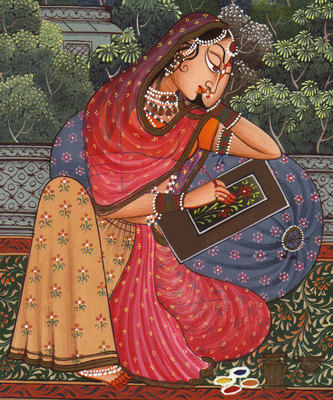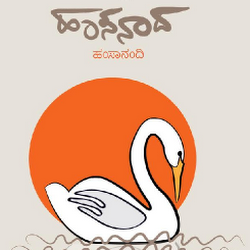You are currently browsing the tag archive for the ‘ಕನ್ನಡ’ tag.
During the past years, I have posted the notation to one of my compositions in this space (and sometimes a recording too). I thought of continuing the tradition for this year as well.
Here is a sapta rAga mAlikA varNa, a garland woven in seven rAgas which I composed few years ago. The composition is about gouri, and I thought it was most apt to be share during this festival.
The sAhitya is in kannaDa (bordering on sama samskrta), and includes rAga mudre. The lyrics are here.
sarasAngika vAchikAdi nartana chaturE SrI gouri ||pallavi||
suvarNAngi poreyE sadAshiva manOhari ||anupallavi||
gItaroopiNi latAngi ||charaNa||
ಸರಸಾಂಗಿಕ ವಾಚಿಕಾದಿ
ನರ್ತನ ಚತುರೇ ಶ್ರೀ ಗೌರಿ ||ಪ||
ಸುವರ್ಣಾಂಗಿ ಪೊರೆಯೇ
ಸದಾಶಿವ ಮನೋಹರೀ ||ಅ.ಪ||
ಗೀತ ರೂಪಿಣಿ ಲತಾಂಗಿ ||ಚರಣ||
The lyrics describe Goddess Parvati as one who is proficient in various aspects of dance such as Angika, vAchika and praises her as the embodiment of song (ಗೀತ). The words can also be wrapped around to make her the embodiment of music. ( ಗೀತ ರೂಪಿಣಿ ಲತಾಂಗಿ – ಸಂಗೀತ ರೂಪಿಣಿ ಲತಾಂಗಿ)
You’d have noticed that the rAgas are Sarasangi, Suvarnangi, and Latangi. What about the rest? The Chitte swara is set in a rAga called Dhavalangi, and the ettugaDe swaras are set in the rAgas Latangi, Kanakangi, Dhaivatangi and Syamalangi.
Although I don’t have a good audio to share today, hopefully I will share that at a future date, but for those of you interested, here is the notation for the composition: sapta-raaga-maalike
Wishing all readers of “ಅಲ್ಲಿದೆ ನಮ್ಮ ಮನೆ” a very happy time during this festive season!
-neelanjana
For the last few years, I have been translating individual verses from Amaru Shataka randomly. Amaruka Shataka is a Samskrta work from the 8th century.
Although there are some stories about Amaruka, we know pretty little historically about him except for that he must have lived before ~800 AD. However there is no doubt that his verses are considered top-class by the best exponents of Rasa theory.
For those of you interested, her is a recording of a talk I gave recently, about Amaruka’s poetry. Also, I have tried to classify the heroes and the heroines of these verses based on the categorization seen in Bharata’s nAtya ShAstra.
I have used the original verses, and my own Kannada translations in this talk – The talk is in a mish-mash of English and Kannada, and so even if you do not understand Kannada, you might find something interesting in the talk:
-neelanjana
This week, on the occasion of Shivratri, padyapaana asked it’s readers to write verses about the following picture of Raja Ravi Varma.
![]()
If you did not know already, the folks running Padayapaana, encourage versification in Kananda and Samskrta using traditional meters by posting a challenge every week. There are also lessons that help newbies understand the concept of versification and writing in such traditional style.
Here are my two attempts for this picture of Ganggavatarana by Raja Ravi varma:
In Bhamini shatpadi:
ಬಾನಿನಿಂದಲಿ ಬೀಳುತಿರಲಾ
ಮಾನಿನಿಯು ಹರಿಪದಗಳಿಂದಲಿ
ನೀನು ದಯೆತೋರುತಲಿ ಮುಡಿಯನು ಹರಡಿ ಲೋಕವನು
ಸಾನುರಾಗದಿ ಕಾಯ್ದೆಯೆನ್ನುತ
ಮಾನಿಸರು ಪೇಳಿಹರು ರುದ್ರನು
ನೀನು ಹೇಗಾದೀಯೆ? ಶಂಕರ ಶಿವನೆ ನೀನೆಂದು!
In mattEbhavikrIDita meter:
ದಿಗಿಲೊಳ್ ಬೇಡಿರಲಾ ಭಗೀರಥ ಮುದಲ್ ಶ್ರೀವಿಷ್ಣು ಪಾದಂಗಳಿಂ
ಭರದೊಳ್ ಬಿರ್ದಿಹ ಗಂಗೆಯಾರ್ಭಟಮನುಂ ಪರ್ಬುತ್ತೆ ನೀಳ್ಗೂದಲಂ
ಹಿತದೊಳ್ ಮಾಣಿಸುತಾಕೆಯಂ ನಲುಮೆಯಿಂ ಕಾಪಿಟ್ಟೆ ಮೂಲೋಕಮಂ
ದಿಟದೊಳ್ ಶಂಕರ ರೂಪಿ ನೀನೆನಿಸಿರಲ್ ನೀ ರುದ್ರನೆಂದೆಂಬರೇ?
The meaning of both the verses is approximately same: When Bhagiratha through his penance, brought the divine river Ganga to the Earth, to save the mankind from the deluge that may be caused by this mighty river, Lord Shiva stopped her and confined her in his long locks of hair. Hence it is befitting to call him Shiva or Shankara (doer of good deeds, blissfull) rather than Rudra (terrible).
Happy Shivaratri to all readers of ಅಲ್ಲಿದೆ ನಮ್ಮ ಮನೆ!
-neelanjana
The stats on ಅಲ್ಲಿದೆ ನಮ್ಮ ಮನೆ indicated today was the day with the highest number of hits in the last 7+ years! A quick look showed most of the people were searching for the phrase “Kannada Rajyostava” reached my post from 3 years ago. It’s then I found that I never posted an audio of the Varna (my composition in Raga Madhuvanti) that I promised to do in that post.
Anyway, let me cut the chaff. A Varna is a musical composition that generally has a romantic theme, and the words go as a conversation between two friends, where in the nAyika is telling about her lover to her friend. Varnas are set to music such that they give a very good overview of the various musical phrases any given raga accommodates. Generally sung at the beginning of a concert in multiple speeds, a Varna is often employed by performers as a quick way of ‘getting to the form’ when on stage.
The lyrics of a large number of Varnas are in Telugu, but that does not mean there aren’t any Varnas with words in other languages such as Kannada, Tamizh or Samskrta. Since this is Kannada Rajyotsava, I am sharing a Varna I composed, with it’s sahitya lines in Kannada.
True to the style of Varnas, the lyrics stick to a romantic format. The Varna is in raga Madhuvanti, a northern import to Karnataka sangeeta, and is set to 2 kaLe Adi tALa. The lines are are inspired by a shloka of Bilvamangala in his classic Krishna Karna Karnamrta.
Pallavi:
ಗೋಕುಲವೆಲ್ಲಾ ಕೊಳಲಿನ ಇನಿದನಿಯಲಿ ತುಂಬಿದನೇ ||
gOkulavellA koLalina inidaniyali tumbidanE
(Translation: He filled Gokula with the melodies his flute)
Anupallavi:
ಅನುಪಲ್ಲವಿ: ಆಕಳ ಮಂದೆಯ ಕಾಯುತ ಗೋಪಿಯರ ತಾನು ಗೆಲಿದನೇ || ಗೋಕುಲವೆಲ್ಲಾ||
AkaLa mandeya kAyuta gOpiyarellare gelidanE
(Translation: The cowherd, won over the hearts of all gopis)
CharaNa:
ಚರಣ: ಮಾತೇ ಮಧುವಂತಿದೆ! ಸಖೀ, ಇವನ || ಮಾತೇ||
mAtE madhuvantide! sakhi ! ivana || mAte||
(Translation: His speech is like honey! Oh my dear!)
The charaNa line was totally my imagination, to include rAga name “madhuvanti” (technically called the ragamudre),
You can listen to a recording of the Varna, played on the flute by Vidwan Vijay Kannan:
https://soundcloud.com/hamsanandi/a-varna-in-madhuvanti
For those of you interested in the notation, click the following links:
A-Varna-in-Madhuvanti (Kannada version)
A-Varna-in-Madhuvanti (Notation in English)
ಎಲ್ಲ ಕನ್ನಡಿಗರಿಗೂ ಕನ್ನಡ ರಾಜ್ಯೋತ್ಸವದ ಶುಭಾಶಯಗಳು!
-neelanjana
 ಅಮರುಕ ಎಂಟನೇ ಶತಮಾನದಲ್ಲಿದ್ದ ಒಬ್ಬ ಸಂಸ್ಕೃತ ಕವಿ. ಈಗ ಕಾಶ್ಮೀರದ ರಾಜನೆಂದೂ, ಮಾಹಿಷ್ಮತಿಯ ರಾಜನೆಂದೂ ಪ್ರತೀತಿಯಿದೆ. ಇವನು ಅಮರುಶತಕ ವೆಂಬ ಹೆಸರಿನಲ್ಲಿ ಪ್ರಖ್ಯಾತವಾಗಿರುವ ಒಂದು ನೂರು ಪದ್ಯಗಳನ್ನು ಸಂಸ್ಕೃತದಲ್ಲಿ ಬರೆದಿದ್ದಾನೆ. ಈ ಪದ್ಯಗಳ ವಿಷಯವೆಂದರೆ ಗಂಡು ಹೆಣ್ಣಿನ ನಡುವಿನ ಪ್ರೇಮ. ಅಮರುಕನ ಒಂದೊಂದು ಬಿಡಿಪದ್ಯವೇ ಒಂದೊಂದು ಕಾವ್ಯದಷ್ಟು ರಸವತ್ತಾಗಿರುತ್ತದೆಂದು ನಂತರದ ಕವಿಗಳು, ವಿಮರ್ಶಕರು ಹೊಗಳಿದ್ದಾರೆ. ಗಂಡು ಹೆಣ್ಣಿನ ನಡುವಿನ ನವಿರಾದ ಪ್ರೇಮ ವಿರಹ ದುಗುಡ ಮೊದಲಾದ ಎಲ್ಲ ಭಾವನೆಗಳನ್ನು ಚಿತ್ರಿಸುವುದರಲ್ಲಿ ಅಮರುಕನಿಗೆ ಅವನೇ ಸಾಟಿ. ಇವನ ಕಾವ್ಯದ ಹಲವು ಹಸ್ತಪ್ರತಿಗಳು ದೊರತಿದ್ದು ಮುಖ್ಯವಾಗಿ ಮೂರು ಪಾಠಾಂತರಗಳಿವೆ – ಇವುಗಳಲ್ಲಿ ಇರುವ ಪದ್ಯಗಳೆಲ್ಲ ಎಲ್ಲವೂ ಒಂದೇ ಆಗಿಲ್ಲ. ಅಲ್ಲದೆ, ನಂತರದ ಕೆಲವು ಕವಿಗಳೂ ಅಮರುಕನದ್ದೆಂದು ಕೆಲವು ಪದ್ಯಗಳನ್ನು ತಮ್ಮ ಕಾವ್ಯಗಳಲ್ಲಿ ಉದಾಹರಿಸಿಯೂ ಇದ್ದಾರೆ. ಇವೆಲ್ಲಾ ಸೇರಿಸಿ, ಅಮರುಕನದ್ದೆಂದು ಹೇಳಲಾಗುವ ಸುಮಾರು ೧೬೦ ಪದ್ಯಗಳಿವೆ.
ಅಮರುಕ ಎಂಟನೇ ಶತಮಾನದಲ್ಲಿದ್ದ ಒಬ್ಬ ಸಂಸ್ಕೃತ ಕವಿ. ಈಗ ಕಾಶ್ಮೀರದ ರಾಜನೆಂದೂ, ಮಾಹಿಷ್ಮತಿಯ ರಾಜನೆಂದೂ ಪ್ರತೀತಿಯಿದೆ. ಇವನು ಅಮರುಶತಕ ವೆಂಬ ಹೆಸರಿನಲ್ಲಿ ಪ್ರಖ್ಯಾತವಾಗಿರುವ ಒಂದು ನೂರು ಪದ್ಯಗಳನ್ನು ಸಂಸ್ಕೃತದಲ್ಲಿ ಬರೆದಿದ್ದಾನೆ. ಈ ಪದ್ಯಗಳ ವಿಷಯವೆಂದರೆ ಗಂಡು ಹೆಣ್ಣಿನ ನಡುವಿನ ಪ್ರೇಮ. ಅಮರುಕನ ಒಂದೊಂದು ಬಿಡಿಪದ್ಯವೇ ಒಂದೊಂದು ಕಾವ್ಯದಷ್ಟು ರಸವತ್ತಾಗಿರುತ್ತದೆಂದು ನಂತರದ ಕವಿಗಳು, ವಿಮರ್ಶಕರು ಹೊಗಳಿದ್ದಾರೆ. ಗಂಡು ಹೆಣ್ಣಿನ ನಡುವಿನ ನವಿರಾದ ಪ್ರೇಮ ವಿರಹ ದುಗುಡ ಮೊದಲಾದ ಎಲ್ಲ ಭಾವನೆಗಳನ್ನು ಚಿತ್ರಿಸುವುದರಲ್ಲಿ ಅಮರುಕನಿಗೆ ಅವನೇ ಸಾಟಿ. ಇವನ ಕಾವ್ಯದ ಹಲವು ಹಸ್ತಪ್ರತಿಗಳು ದೊರತಿದ್ದು ಮುಖ್ಯವಾಗಿ ಮೂರು ಪಾಠಾಂತರಗಳಿವೆ – ಇವುಗಳಲ್ಲಿ ಇರುವ ಪದ್ಯಗಳೆಲ್ಲ ಎಲ್ಲವೂ ಒಂದೇ ಆಗಿಲ್ಲ. ಅಲ್ಲದೆ, ನಂತರದ ಕೆಲವು ಕವಿಗಳೂ ಅಮರುಕನದ್ದೆಂದು ಕೆಲವು ಪದ್ಯಗಳನ್ನು ತಮ್ಮ ಕಾವ್ಯಗಳಲ್ಲಿ ಉದಾಹರಿಸಿಯೂ ಇದ್ದಾರೆ. ಇವೆಲ್ಲಾ ಸೇರಿಸಿ, ಅಮರುಕನದ್ದೆಂದು ಹೇಳಲಾಗುವ ಸುಮಾರು ೧೬೦ ಪದ್ಯಗಳಿವೆ.
ಇವನ ಬಗ್ಗೆ ಇನ್ನೊಂದು ಕಥೆಯೂ ಇದೆ. ಮಂಡನಮಿಶ್ರರ ಹೆಂಡತಿ ಉಭಯಭಾರತಿಯ ಜೊತೆ ಆದಿಶಂಕರರ ವಾದ ನಡೆಯುತ್ತಿದ್ದಾಗ ಆಕೆ ಸಾಂಸಾರಿಕ ಜೀವನದ ಬಗ್ಗೆ ಪ್ರಶ್ನೆ ಮಾಡಲು, ಬಾಲ ಸನ್ಯಾಸಿಯಾಗಿದ್ದ ಶಂಕರರು ತಮ್ಮ ಅನುಭವದಿಂದಲೇ ಆ ಪ್ರಶ್ನೆಗೆ ಉತ್ತರಿಸಲು ಅಕಾಲದಲ್ಲಿ ಸತ್ತು ಹೋಗಿದ್ದ ಅಮರುಕನ ದೇಹದಲ್ಲಿ ಪರಕಾಯ ಪ್ರವೇಶಮಾಡಿದ್ದರೆಂದೂ, ಆ ಸಮಯದಲ್ಲಿ ಅವರು ಬರೆದ ಪದ್ಯಗಳೇ ಈ ಅಮರುಶತಕವೆಂದೂ ಕೆಲವು ಶಂಕರ ವಿಜಯ ಕಾವ್ಯಗಳು ಹೇಳುತ್ತವೆ. ಇವುಗಳ ಸತ್ಯಾಸತ್ಯತೆ ಹೇಗೇ ಇರಲಿ – ಅಮರು ಬರೆದ ಪದ್ಯಗಳು ಸಾವಿರದಿನ್ನೂರು ವರ್ಷಗಳ ನಂತರವೂ ರಸಿಕರ ಮನ ಸೆಳೆಯುತ್ತಿವೆ. ಅಂದ ಹಾಗೆ , ಎಸ್ ಎಲ್ ಭೈರಪ್ಪ ಅವರ ’ಸಾರ್ಥ’ ಕಾದಂಬರಿಯನ್ನು ಓದಿದ್ದವರಿಗೆ ಅದರಲ್ಲಿ ಬರುವ ಅಮರುಕನ ಪಾತ್ರ ನೆನಪಾದರೂ ಆಗಬಹುದೇನೋ.
ಅಮರುಕನ ಪದ್ಯಗಳು ಅವುಗಳ ಲಾಲಿತ್ಯಕ್ಕೆ ಹೆಸರುವಾಸಿ. ಹಾಗಾಗಿ ಅವುಗಳ ಅನುವಾದ ಸ್ವಲ್ಪ ಕಷ್ಟವೇ ಆದರೂ, ಮನಸ್ಸಿಗೆ ಬಹಳ ತೃಪ್ತಿ ಕೊಡುವಂತಹವು. ನಾನು ಮಾಡಿರುವ ಅನುವಾದಗಳಲ್ಲಿ ಕೆಲವನ್ನು ಇಲ್ಲಿ ಕೊಟ್ಟಿದ್ದೇನೆ.
****
ಯಾವಾಗಲೋ ಒಮ್ಮೆ ನಾಯಕಿ ತನ್ನ ನಲ್ಲನಲ್ಲಿ ಹುಸಿಮುನಿಸು ತೋರಿದಳು. ಆದರೆ ಅದು ಸುಳ್ಳು ಎಂದರಿಯದ ಅವನು ದೂರವಾಗಿಬಿಟ್ಟ. ಈಗ ಇವಳಿಗೆ ಉಳಿದಿದ್ದೇನು? ಬರೀ ಒಂಟಿತನ. ತನ್ನ ಕೊರಗನ್ನು ಹೇಳಿಕೊಳ್ಳುವುದಕ್ಕೆ ಒಬ್ಬ ಗೆಳತಿಯಿದ್ದಾಳಲ್ಲ, ಸದ್ಯ! ಇಲ್ಲದಿದ್ದರೆ ಇವಳ ಪಾಡು ಏನಾಗುತ್ತಿತ್ತೋ! (ಅಮರುಶತಕ: ೧೫)
ಯಾವುದೋ ಹುಸಿಮುನಿಸಿನಲಿ ನಾ ಸುಮ್ಮನೇ ಹೋಗೆನ್ನಲು
ಕಲ್ಲು ಮನದಾ ನಲ್ಲ ತಟ್ಟನೆ ಸಜ್ಜೆ ಯಿಂದಲಿ ಎದ್ದು ತಾ
ಭರದಿ ಪ್ರೇಮವ ಗೆಳತಿ ಹೇವದಿ ಮುರಿಯುತಲಿ ದೂರಾದರೂ
ನಾಚದೀ ಮನವವನೆಡೆಗೆ ಹೋಗುವುದಕೇನನು ಮಾಡಲೇ?
ನಲ್ಲನಿಗೆ ತನ್ನಲ್ಲಿ ಮೊದಲಿದ್ದ ಪ್ರೇಮ ದೂರವಾಗಿದೆ ಎಂಬ ಅನಿಸಿಕೆ ಇವಳಲ್ಲಿ. ಆದರೆ ಅವನನ್ನೇ ನೆನೆವುದನ್ನೂ ಬಿಡಲಾರಳು. ತನ್ನ ಅಳಲನ್ನು ತನ್ನ ಗೆಳತಿಗಲ್ಲದೇ ಇನ್ನಾರಿಗೆ ತಾನೇ ಹೇಳುವಳು? (ಅಮರುಶತಕ – ೩೮)
ಒಲವಿನಾ ಕಟ್ಟುಗಳನೆಲ್ಲ ಕಳಚಿ
ಬಲುದೂರವಾಗಿಸಿದ ಪ್ರೀತಿಯಾದರವ
ನಲುಮೆ ಭಾವಗಳನ್ನು ಹಿಂದೆ ಸರಿಸಿ
ಸಲೆ ಹೊಸಬನಂತವನು ದೂರ ಹೋದ!
ಕಣ್ಣಾರೆ ಕಂಡರೂ ಈ ಕಡೆಗಣಿಕೆಯನ್ನು
ಮುನ್ನದಾದಿನಗಳನೆ ಮತ್ತೆ ನೆನೆನೆನೆದೂ
ನುಚ್ಚುನೂರಾಗದೆಯೆ ಉಳಿಯಿತೇಕೆ
ಎನ್ನೆದೆಯು ಎಂಬುದನು ನಾನರಿಯೆ ಗೆಳತಿ!
ಆ ಗೆಳತಿಯೋ ಸ್ವಲ್ಪ ಲೋಕದ ರೀತಿ ನೀತಿಗಳನ್ನು ಅರಿತವಳು ಅಂತ ಕಾಣುತ್ತದೆ. ಅವಳು ಕೊಡುವ ಸಲಹೆಯೇನೋ ತಕ್ಕದ್ದೇ. ಆದರೆ, ಪ್ರೇಮದಲ್ಲಿ ಬಿದ್ದವಳಿಗೆ ಆ ಸಲಹೆ ಒಪ್ಪುತ್ತದೆಯೇ? ( ಅಮರುಶತಕ: ೭೦)
ಬಾಳನೆಲ್ಲವು ನೀನು ಮುಗುದೆತನದಲ್ಲಿಯೇ
ಹಾಳು ಮಾಡಲು ಹೊರಟಿರುವೆಯೇಕೆ ಹೆಣ್ಣೆ?
ಬಿಟ್ಟು ನೇರದ ದಾರಿ ತುಸುಸೆಡವು ತೋರಿಸುತ
ದಿಟ್ಟೆಯಾಗುವುದಿಂದು ನಿನಗೆ ಬಹು ಒಳಿತು!
ಮುದದಿ ಗೆಳತಿಯು ಹೀಗೆ ಕಿವಿಮಾತು ಹೇಳಿರಲು
ಬೆದರುಮೊಗದಲ್ಲೀಕೆ ಮರುನುಡಿಯುತಿಹಳು
ಮೆಲ್ಲ ನುಡಿ ಸಖಿ ನೀನು! ಕೇಳಿಬಿಟ್ಟಾನವನು
ನಲ್ಲ ನೆಲೆನಿಂತಿರುವನೆನ್ನ ಎದೆಯಲ್ಲೆ!
ಕೋಪ ಕಳೆದು ಮತ್ತೆ ಬರುವನೇನೋ ಪ್ರಿಯಕರ ಎಂದು ಇವಳು ಕಾದದ್ದೇ ಬಂತು. ಅವನು ಬರಲೇ ಇಲ್ಲ. ಕೊನೆಗೆ ಕೋಪ ಮೀರಿ ಗೆಳತಿಗೆ ಈತನನ್ನು ಮರೆಯುತ್ತೇನೆಂದು ಅವಳು ಹೇಳಿದ್ದು ನಿಜವೇ? (ಅಮರುಶತಕ: ೭೩)
ಗೆಳತಿ! ನನ್ನೆದೆ
ಒಡೆದರೂ ಸರಿ ;
ಎನ್ನೊಡಲ ಆ ಮದನ
ಸೊರಗಿಸಿದರೂ ಸರಿ ;
ಒಂದೆಡೆ ನಿಲ್ಲದವನಲ್ಲಿ
ನಾನದೆಂತು ಒಲವನಿಡಲೇ?
ಹೀಗೆ ಸಿಟ್ಟಿನಲಿ
ಸೆಡವಿನಲಿ ನುಡಿಯುತ್ತಲೇ
ನಲ್ಲನ ದಾರಿಯ
ಕಳವಳದಲಿ
ಬಿಡದೇ ನೋಡಿದಳು
ಚಿಗರೆಗಣ್ಣಿ!
ಇವಳ ಪುಣ್ಯವೋ ಅವನ ಪುಣ್ಯವೋ, ಕೊನೆಗೂ ಪ್ರಿಯತಮ ತನ್ನಲ್ಲಿಗೆ ಮರಳುತಿದ್ದಾನೆಂಬ ಸಿಹಿ ಸುದ್ದಿ ಹೇಗೋ ಇವಳಿಗೆ ಮುಟ್ಟಿತು. ಆದರೆ ಬಂದವನನ್ನು ಹಾಗೇ ಕರೆದು ಅಪ್ಪಿಕೊಂಡುಬಿಟ್ಟರೆ ಅದು ಇವಳ ಅಭಿಮಾನಕ್ಕೆ ತಕ್ಕುದೇ? ಶಾಂತಂ ಪಾಪಂ! ಸರಿಯಾದ ತಯಾರಿಯನ್ನೇ ನಡೆಸಿದ್ದಾಳೆ ಈಕೆ. ಆದರೆ ಗೆಲುವು ಯಾರದ್ದು? ಕಾಯ್ದು ನೋಡುವುದೊಂದೇ ದಾರಿ (ಅಮರುಶತಕ: ೯೨)
ಹುಬ್ಬು ಗಂಟಿಕ್ಕಿದ್ದಾಯಿತು
ಬಹುಕಾಲ
ಕಣ್ಮುಚ್ಚಿರುವುದನು
ರೂಢಿಸಿದ್ದಾಯ್ತು
ಜೊತೆಗೆ ಅಳುವುದ
ಚೆನ್ನಾಗಿ ಕಲಿಸಿದ್ದಾಯಿತು
ನಗುವನೊತ್ತಾಯದಲಿ
ಮೌನದಲಿ ನಿಲಿಸಾಯ್ತು
ಮನಸ ಹೇಗೋ
ಗಟ್ಟಿ ಮಾಡುತ್ತ
ಕಡುದಿಟ್ಟತನದಲಿ
ಕಟ್ಟಿರಿಸಿದ್ದಾಯಿತು
ಹಮ್ಮು ಬಿಡದಿರಲಿಕೆ
ಎಲ್ಲ ಅಣಿಗೊಳಿಸಾಯ್ತು
ಇನ್ನು ಗೆಲುವನು
ದೇವರಿಗೇ ಬಿಟ್ಟಾಯ್ತು
ಅಂತೂ ಕಾತರದಿಂದ ಕಾಯುತ್ತಿದ್ದವಳಿಗೆ ನಲ್ಲ ಬಾಗಿಲಲ್ಲಿ ಬಂದುದು ಕಂಡಿತಲ್ಲ. ಏನು ಮಾಡುವಳು ಅವಳೀಗ? ನೇರವಾಗಿ ಅವನನ್ನು ಒಪ್ಪುವಳೇ? ಅಪ್ಪುವಳೇ? ಮತ್ತೆ ಹುಸಿಮುನಿಸು ತೋರಬಾರದಲ್ಲವೇ? ( ಅಮರುಶತಕ: ೧೫)
ನಲ್ಲ ಬಂದುದ ನೋಡಿ ನಿಂತು ಸ್ವಾಗತಿಸುತ್ತ
ಪಕ್ಕದಲಿ ಕೂರುವುದ ತಪ್ಪಿಸಿದಳು ;
ತಾಂಬೂಲವನು ಕೊಡುವ ನೆವದಿಂದ ಒಳಹೋಗಿ
ಅಪ್ಪುಗೆಗೆ ಅಡ್ಡಿಯನು ತಂದಿಟ್ಟಳು ;
ಜೊತೆಯ ಪರಿಜನರೊಡನೆ ತೊಡಗುತ್ತ ಸೋಗಿನಲಿ
ಅವನ ಮಾತಿಗೆ ತಾನು ಸಿಗದಿದ್ದಳು ;
ಮಾಡುವುಪಚಾರದಲಿ ಕೊರತೆಯನು ಕಾಣಿಸದೆ
ಚದುರೆ ಮನಸಿನ ಮುನಿಸ ಮೈವೆತ್ತಳು !
ಇಷ್ಟೆಲ್ಲಾ ನಡೆದರೆ ಅವನಿಗೆ ಪ್ರೇಯಸಿಯ ಅಂತರಂಗ ತಿಳಿಯದೇ ಹೋದೀತೇ? ಇವಳು ಏನು ಜಾಣತನ ಮಾಡಿದರೂ, ಅವನು ಬಳಿಗೆ ಬಾರದೇ ಹೋಗುವನೇ? ( ಅಮರುಶತಕ: ೪೪)
ದೂರದಿಂದಲಿ ಹುರುಪಿನಲಿ
ಬಂದರೆಲ್ಲಿಗೋ ಜಾರಿದವು
ಮಾತನಾಡಿಸಲು
ಥಟ್ಟನೇ ಬಿರಿದವು
ಅಪ್ಪಿಕೊಂಡರೆ
ಕೆಂಪಾದುವು
ಉಡುಗೆಯನು ಹಿಡಿಯೆ
ಸಿಟ್ಟಿನಲಿ ಹುಬ್ಬ ಗಂಟಿಕ್ಕಿದವು
ಪಾದವೇ ಗತಿಯೆನುತ
ಅವಳಡಿಗೆ ಬೀಳಲು
ಚಣ ಮಾತ್ರದಲಿ
ನೀರು ತುಂಬಿದವು
ಹಾ! ಏನಚ್ಚರಿಯೊ!
ಇವಳ ಕಣ್ಣುಗಳು
ನಲ್ಲನ ತಪ್ಪಿಗೆ ತಕ್ಕ
ಚತುರತೆಯ ತಾಳಿಹವು!
ಅಂತೂ ಅವನು ಇವಳ ಕಾಲಿಗೆ ಬಿದ್ದನಲ್ಲ? ಇನ್ನು ಮುನಿಸೇಕಿರುವುದು? ಅಂತೂ ಇಂತೂ ಕಥೆ ಸುಖಾಂತ!
(ಕೊ: ಅಮರುಶತಕದ ಪದ್ಯಗಳೆಲ್ಲ ಬಿಡಿಹೂಗಳಂತೆ, ಬಿಡಿಮುತ್ತುಗಳಂತೆ. ಅವುಗಳಿಗೆ ಮುಕ್ತಕಗಳೆಂದೇ ಹೆಸರು. ನಾನು ಕೆಲವನ್ನು ಒಂದಾದರೊಂದು ಬರುವಂದೆ ಸೇರಿಸಿ, ಒಂದು ಕಥೆಯಂತೆ ಹೇಳಿದ್ದೇನೆ ಅಷ್ಟೇ! )
Picture courtesy: http://www.artnindia.com/wp-content/uploads/imported/Ragini-Ragamala-HANDMADE-Painting-Rajasthani-India-Ethnic-Folk-Paper-Fine-Art-190775005906.jpg
(ಕಳೆದ ತಿಂಗಳು ನಿಲುಮೆ.ನೆಟ್ http://www.nilume.net/ ಗೆಂದು ಬರೆದ ಬರಹವನ್ನು, ಇಲ್ಲಿಯೂ ಇಂದು ಹಾಕಿದೆ)




ಇತ್ತೀಚಿನ ಟಿಪ್ಪಣಿಗಳು